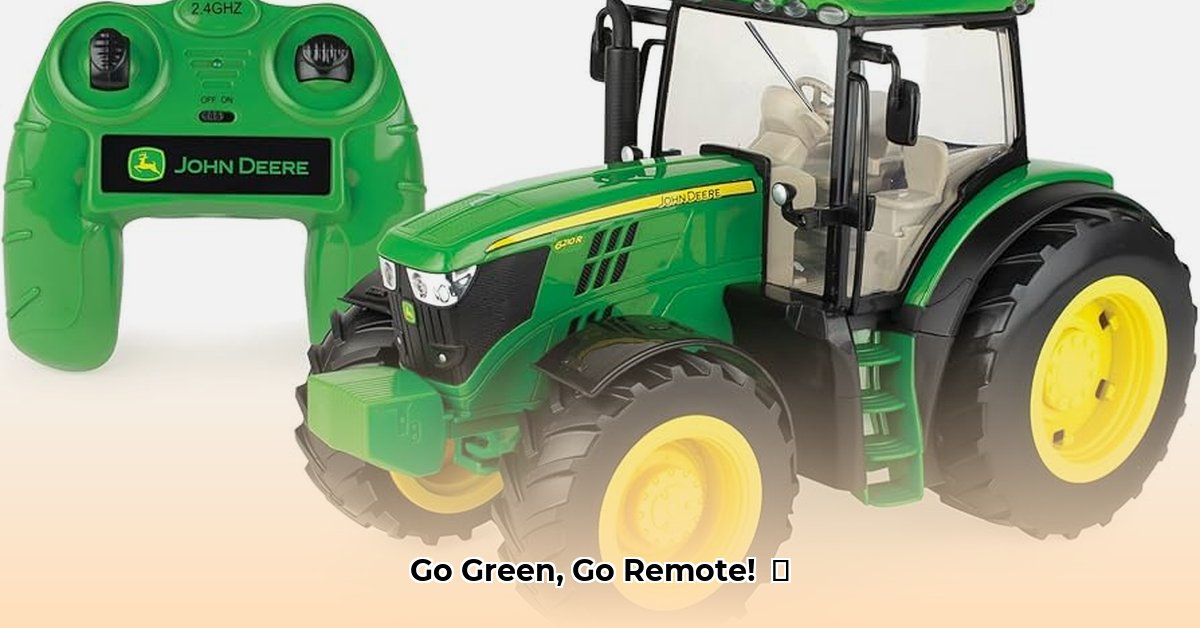
Remote Control Tractor: Sustainable Fun Now?
Remote control (RC) tractors – miniature farming machines captivating children's imaginations – are ubiquitous. But their environmental impact often goes unnoticed. While providing hours of fun, typical plastic RC tractors carry a hidden cost. This article explores the creation of genuinely eco-friendly RC tractors, examining their journey from manufacturing to disposal. Are we ready to embrace sustainable fun? The answer, surprisingly, is closer than you think. For more information on eco-friendly RC tractors, check out this helpful resource.
The Current Landscape: A Tiny Tractor's Big Footprint
A quick online search reveals hundreds of RC tractors varying in size, price, and features. However, the vast majority utilize petroleum-based plastics, produced through energy-intensive processes and shipped globally. This generates a significant, often overlooked, carbon footprint. Furthermore, their short lifespans contribute to plastic waste. This presents a unique opportunity: creating eco-conscious RC tractors that are both fun and sustainable—a concept with potential applications beyond children's toys, extending to precision agriculture.
Environmental Impact: More Than Meets the Eye
RC tractor production involves a complex chain with potential negative environmental consequences at every stage. Raw materials extraction and processing demand energy and release greenhouse gases. The manufacturing process itself consumes further energy (mostly from fossil fuels). Transportation adds to emissions. Finally, disposal typically involves landfills, exacerbating plastic waste. The total environmental cost of a single plastic RC tractor is surprisingly high, significantly exceeding what most consumers realize. While standardization of measurement is ongoing, the overall concern is undeniable. Isn't it time we demanded better?
Sustainability Challenges: Navigating the Path to Green
Creating truly sustainable RC tractors faces numerous hurdles. A risk assessment highlights key areas needing improvement:
| Challenge | Risk Level | Mitigation Strategies |
|---|---|---|
| Sourcing Sustainable Materials | High | Transition to recycled plastics, sustainable alternatives (bioplastics), requiring R&D investment and reliable supply chains. |
| Energy-Efficient Manufacturing | Medium | Implement energy-efficient processes using renewable energy (solar, wind), requiring new machinery and employee training. |
| Sustainable Transportation | Low | Explore eco-friendly shipping (electric vehicles or ships), optimize routes to reduce fuel consumption. |
| Carbon Offsetting | Medium | Utilize carbon offsetting programs with verification and transparency to ensure genuine benefit. |
| Consumer Education | High | Public awareness campaigns to inform consumers and encourage support for eco-friendly brands. |
Sustainable Solutions: Companies Making a Difference
Several companies demonstrate that sustainable toy production is achievable. Some integrate recycled plastics, reducing reliance on virgin materials. Others employ innovative, less energy-intensive manufacturing techniques. Some even partner with organizations for carbon offsetting programs. These are crucial first steps, but broader industry adoption is needed for significant impact.
Actionable Steps for a Greener Future
Collaboration amongst multiple stakeholders is vital:
- Toy Manufacturers: Prioritize recycled and bio-based materials; minimize waste; transparently report environmental impact; invest in lifecycle assessments (LCAs).
- Parents: Purchase eco-friendly RC tractors; support sustainable companies; choose durable toys to extend lifespan and reduce waste.
- Agricultural Tech Firms: Lead by example with larger, eco-conscious RC tractors for precision farming; demonstrate broader applicability.
- Certification Bodies: Develop robust standards for certifying sustainable toys, ensuring transparency and consumer trust.
The Future of Eco-Friendly Remote Control Tractors
The future of RC tractors is intertwined with the broader sustainability movement. Growing consumer awareness and potential regulations will drive manufacturers toward eco-friendly practices. Companies adapting and innovating will thrive. A sustainable RC tractor is not a fantasy, but a reachable goal – a future we can help create.
How to Choose Truly Sustainable Remote Control Tractors
What Makes an RC Tractor Truly Sustainable?
Sustainability demands a holistic approach. Consider:
- Materials: Recycled or sustainably sourced plastics? Renewable materials (bamboo, bioplastics)?
- Manufacturing: Carbon footprint; renewable energy use?
- Energy Efficiency: Rechargeable batteries; environmentally sound battery technology?
- Durability & Longevity: Longer lifespan reduces replacements; durable products minimize waste.
- End-of-Life Management: Recycling or responsible disposal plan?
Navigating the Challenges: Overcoming Obstacles
Creating fully eco-friendly RC tractors is challenging. Finding sustainable materials that meet performance standards is difficult and expensive. The higher cost of eco-friendly materials might deter budget-conscious consumers.
Case Studies: Leading the Way to Eco-Friendly Fun
Some companies are already leading the charge, utilizing recycled plastics and exploring bio-based polymers. Look for manufacturers committed to transparency and environmental responsibility and check their certifications.
Actionable Steps: Making a Difference
For Parents: Choose recycled or sustainably made RC tractors; support transparent companies; teach responsible disposal. For Manufacturers: Invest in sustainable materials and processes; seek certifications; offer take-back programs. For Certification Bodies: Develop specific standards for eco-friendly RC tractors.
The Future of Sustainable RC Tractors
Growing consumer demand and forthcoming regulations will transform the industry. Eco-friendly RC tractors are the future; it’s a future we can shape.